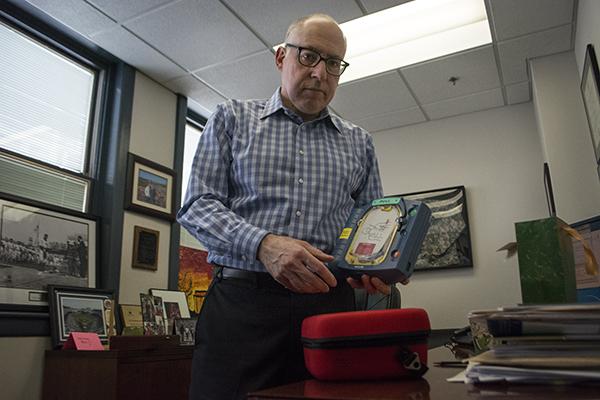One medical school professor wants to put life-saving technology in the hands of ordinary citizens.
Jonathan Reiner, a professor of medicine and health sciences and director of GW Hospital’s cardiac catheterization lab, helped write and is currently lobbying for a bill that would increase the number of Automated External Defibrillators available throughout the country.
The Cardiac Arrest Survival Act of 2015 will expand immunity from civil liability in cases of AED use – meaning ordinary citizens could not be punished for coming to the aid of someone in cardiac arrest. The bill would also ensure that businesses and owners of AEDs will be protected from legal action against them when they use AEDs.
“This is a fire extinguisher for someone who is having a heart attack,” Reiner said. “Imagine if your fire extinguisher said ‘to only be used by trained responders’ or if some of the laws in the country required you to have fire department supervision.”
He said that all 50 states and D.C. have laws protecting AED owners from legal action if the person they treat is injured further, but laws differ from state to state. He said this bill would create a national precedent that would make companies and individuals feel safer owning and using the technology.
“As long as your device is in good working order, you are protected from any sort of lawsuit that might arise from trying to save someone’s life,” Reiner said.
Still, families of individuals who suffer from cardiac arrest have filed suits against owners and users of AEDs if the attempts to revive victims are unsuccessful.
A Maryland couple filed a $40 million lawsuit against a swim club in 2009 when paramedics revived their son using a defibrillator after about 10 minutes. The child now suffers from serious brain damage and the lawsuit claimed the club was negligent because it did not have an AED on site.
The bill is going through committee for the third time and Reiner said he’s optimistic it will pass this time because they are proposing it as noncontroversial, meaning that it shouldn’t see opposition if it reaches the floor. Reiner said he goes to Congress a few times a month to advocate for the bill.
An AED is a small portable device that analyzes heart rhythm and will respond with an electrical shock to restore normal heart rhythm if a problem is detected. The technology gives audio instructions when the kit is opened and is designed for inexperienced users.
Reiner said he pitched the idea of a nationally uniform baseline of protection for all AED users five years ago and wrote a version of the bill with help from pro bono lawyers. The bill has been in committee two times before and he testified at a hearing at the end of last year, Reiner said.
“I still remain optimistic and idealistic enough to think that an individual can come up with an idea and that Congress can pass that bill,” Reiner said.
Reiner said the American Heart Association and about a dozen other organizations support the bill. It is co-sponsored by Rep. Gerald Connolly, D-Va., and Rep. Pete Olson, R-Texas.
Connolly said that as a member of local government in Virginia, he made it a priority that buildings and schools in his county deploy the lifesaving technology and that staff have the knowledge and training to use the technology.
“Access to AEDs is critical to saving lives during a cardiac emergency,” Connolly said. “Dr. Reiner’s expertise, passion and continued advocacy has been instrumental in raising public awareness on this important and lifesaving issue.”
Reiner, who is an interventional cardiologist, has spent the last five years advocating for more AEDs in public places like libraries and community centers. He said lives can be saved when people are resuscitated promptly.
“The difference between having one of these devices and not having one of these devices is the difference between someone you care about going back to the ones they love and the work they do or being buried,” Reiner said.
In 2009, Reiner and the GW Heart and Vascular Institute launched ReStart D.C., a program that raises money to add AEDs in public spaces and to train staff members on how to use the defibrillators. Reiner said he raised nearly $400,000 to buy AEDs for churches, Boys and Girls Clubs of America and all of the D.C. public libraries.
“This whole effort is our way of taking what started with ReStart and giving away defibrillators and teaching people how to use them, to how to increase access to this on a national level,” Reiner said.







